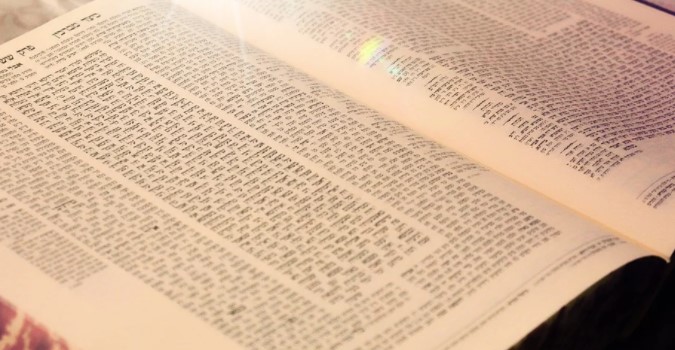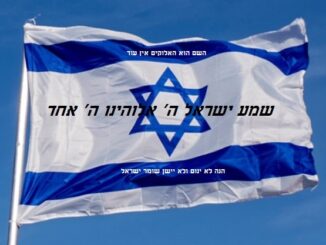
A mother who loved Torah was the one who was behind the founding the Daf Yomi.
However, she is getting little credit so I will credit her.
Rabbi Meir Shapiro who is famous for setting up the Daf Yomi daily learning system credited his mother Rebbetzin Margulya Shapiro for it.
Rabbi Shapiro explained that when he was a child, his mother hired a melamed (teacher) to teach him Torah. However, when it was getting late and the teacher still did not arrive, his mother began crying.
“My mother sat and cried. I tried to calm her down by saying, “Mommy, Mommy, why are you crying, I’ll learn tomorrow!’”
“My mother answered, “Meir’el, you can’t imagine the value of one day of Torah study!”
She explained that “a day without Torah is a precious day lost that can never be gotten back.
By learning Torah the day is elevated and everlasting.”
Rabbi Shapiro was so inspired by his mother’s love for Hashem and His Torah that it gave him the drive to create a daily learning schedule of the Daf Yomi movement.
Daf haYomi literally, “daily page”, is a program of learning one two-sided page of Talmud a day, allowing a full cycle to be completed once about every seven years.
The Rabbis in the Gemarah explain that a person should first learn the entire Torah so they know all the laws and only then should a person delve deep into each sugya.
As it states in Gemurah Avoda Zarah 19:a
ואמר רבא לעולם ילמד אדם תורה ואחר כך יהגה שנאמר בתורת ה’ והדר ובתורתו יהגה ואמר רבא לעולם ליגריס איניש ואף על גב דמשכח ואף על גב דלא ידע מאי קאמר שנאמר (תהלים קיט, כ) גרסה נפשי לתאבה גרסה כתיב ולא כתיב טחנה
And Rava says in reference to this verse: A person must always study Torah and gain a broad knowledge of it, and only then may he analyze and delve into it. As it is stated: “His delight is in the Torah of the Lord,” meaning that he studies the Torah on a basic level, and only afterward does the verse state: “And in his Torah he meditates,” i.e., he analyzes it.
And Rava says with regard to Torah study: A person should always study [ligeris] and review even though he may afterward forget, and even though he does not understand what it is saying. As it is stated with regard to the study of Torah: “My soul breaks [garesa] for the longing that it has for Your ordinances at all times” (Psalms 119:20). It is written: “Breaks,” and it is not written: Grinds, demonstrating that the soul is satisfied with breaking apart material, on a basic level, even if it does not have the opportunity to grind and analyze it in greater depth.
The Daily Daf, the same page of Gemuarah, is learned by thousands of Jews, male and female, around the world, all in the merit of the righteous mother Rebbetzin Shapiro.
It always surprises me to hear or read articles by women who say they are having a hard time on Simchas Torah.
These women, some of whom are kollel wives, say that it is hard for them to watch their husbands and sons dancing so excitedly with the Torah which they get to learn all day while she, the mother, does not feel that she has any part of or connection with the Torah.
This is very wrong, the Torah was given at Har Sinai to all Jews, male and female. Hashem told Moisha to speak to women first and then to men.
כא תאמר לבית יעקב ותגיד לבני ישראל
Hashem gave the Torah to women first and then to men, so we, the women, can keep a kosher home and teach His Torah to the next generation of Jews.
The Gemarah meseches Yima Daf 71 advises men that if they want children who are בן תורה – Torah scholar, they should marry a בת תלמוד חכם a woman who is learned so that she can teach Torah to their children.
We know that a man who learns Torah are referred to as a בן תורה (this does not mean he is the son of a learned man, but rather he himself is a learned man). The same is true with a woman. The Gemurah referred to a Torah educated woman as a בת תלמוד חכם.
In Gemurah we often see that women were in shul learning Torah with the rabbis, and they presented great questions before the rabbis during the lectures.
Many of those great questions are quoted in the Gemarah and the rabbis took the time to respond to them.
So much so, that they felt it’s important to include questions and answers in the Gemurah. Many times, the names of the woman who asked the good questions were also included.
In Gemarah meseches Yima Daf 66:B:12-14 it says that “a wise woman” asked a question from Rabbi Eleizer and his students (the Gemurah discuses the question and answer).
Even Rabbi Eleizer who was seen as somewhat of an extremist in those days, and believed that women should not sit and learn Torah, allowed women to join and learn in his classes.
Rabbi Eleizer was known to only give answers which he heard from his rabbi, and did not always respond with answers directly to the question, as was in this case.
Rebbi Eleizer said: שָׁאֲלָה אִשָּׁה חֲכָמָה אֶת רַבִּי אֱלִיעֶזֶר: מֵאַחַר שֶׁמַּעֲשֵׂה הָעֵגֶל שָׁוִין, מִפְּנֵי מָה אֵין מִיתָתָן שָׁוָה
אָמַר לָהּ: אֵין חׇכְמָה לָאִשָּׁה אֶלָּא בְּפֶלֶךְ, וְכֵן הוּא אוֹמֵר: ״וְכׇל אִשָּׁה חַכְמַת לֵב בְּיָדֶיהָ טָווּ״.
Rabbi Eleizer told the woman: There is no wisdom in a woman except weaving with a spindle, and so it states: “And any woman who was wise-hearted spun with her hands” (Exodus 35:25).
Rav and Levy saw this as a great question, and they explained the matter to her with the following:
.אִיתְּמַר, רַב וְלֵוִי. חַד אָמַר: זִיבֵּחַ וְקִיטֵּר — בְּסַיִיף. גִּפֵּף וְנִישֵּׁק — בְּמִיתָה. שָׂמַח בִּלְבָבוֹ — בְּהִדְרוֹקָן
.וְחַד אָמַר: עֵדִים וְהַתְרָאָה — בְּסַיִיף, עֵדִים בְּלֹא הַתְרָאָה — בְּמִיתָה, לֹא עֵדִים וְלֹא הַתְרָאָה — בְּהִדְרוֹקָן
A woman who runs her home, must learn and be well versed in all halachas, laws of the Torah, in order to run a true Jewish home.
Even when you live near a Rav, a woman must know the Torah laws because if she does not learn, she may not know when to ask questions if she runs into something questionable.
A Rav may also not be able to answer every question because the Rav may not know all the relevant details and the woman would not feel the need to share everything and omit important points that may change the halacha drastically.
If a woman cooks something and does not know the laws of בשר וחלב, meat and dairy, or Hilchos Shabbos correctly, she may accidentally feed questionable food to her family. If a woman does not learn Hilchos נידה, Niddah, she may not know the laws of purity and cause issues in her marriage.
Learning masechet tractate Niddah was one of the most interesting masechetes for me. Seeing how the women of the past were very much the same as women today with the same emotions, was fascinating. Also, it teaches the beauty of the mitzvah which was never meant to restrict a woman but to the contrary it empowers the woman.
Every woman needs to learn Torah, there are so many free lectures online, on phone lines or free translations of the Entire Torah in many languages, so everyone can understand the Torah. See here https://www.sefaria.org.il.


